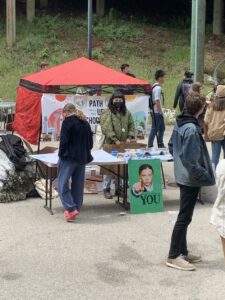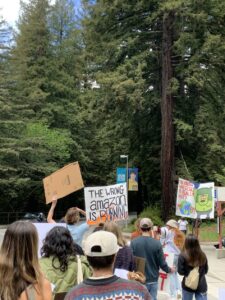
By Remington Plischke
UCSC’s Climate Coalition hosted a rally for Earth Day last Friday, inciting enthusiasm among the student body for climate action. They offered teach-ins through the day, free to the whole community, on a variety of climate-related subjects. The main event featured environmentalist speakers and a spirited march to Kerr Hall. The goal of the Climate Coalition is for the UC system to be completely fossil fuel free by 2030, as well as a climate based general education requirement.
In an interview with Max Rogosienski, a member of the steering committee, he solidified the importance of the UC system taking a leading role in global climate action. He said, “The chance to create climate salvation would be for UC creating a system-wide change that can enact system-wide change across the globe.” University students are well-known for their impact on social evolution, and young people show promise to be the face of climate action.
The student and faculty speakers inspired the gathering crowd and voiced their intentions for the rally. Derede Arthur, a UCSC writing professor and steering committee member, gave a land acknowledgement and emphasized that acknowledgement means little unless accompanied by action. Arthur affirmed, “If we do not look at how unequally prepared people are to face the traumas of a warning world, if we do not do all we can today both to address historical wrongs and prepare those most vulnerable for the future, any land acknowledgement means little.” The crowd roused and cheered as she continued, “We will not carry on business as usual as our world burns and the most vulnerable endure the consequences.” Arthur seemed to motivate the students as change-makers, and they marched with valiton after hearing her words. Students marched from The Quarry and along Mclaughlin Dr, before marching through Science Hill to Kerr Hall. They chanted along the way, “Hey hey, ho ho, fossil fuels have got to go” while flaunting signs such as “The wrong amazon is burning.” When they arrived, Chancellor Cynthia Larive agreed to talk with some of the committee members. Standing next to the students and near the entrance of the building, she answered their questions. Ultimately, she agreed with their motives, hopes to start the transition away from fossil fuels, and is requesting funding from the office of the president to start this transition. As for a projected timeline, she said “We’ve been talking about a 5 year plan.” In comparison to other institutions, this is a commendable goal. However, as one of the steering committee members, Lisette Jones, quickly pointed out “We don’t have 5 years. One of our own scientists at UCSC, Pam Rittlemeyer, was a contributor on the latest IPCC report which tells us we have 3 years.” Lisette was referring to a recent press report from the IPCC, The Intergovernmental Panel on Climate Change, associated with the United Nations. It stated fossil fuel emissions must peak before 2025 in order to limit global warming to an increase of 1.5 degrees celsius. The chancellor replied to Lisette’s comment “there’s a lot we can do as a campus, and there’s a lot we can do as individuals,” affirming the role of unity in climate action. She encourages students to continue lobbying efforts as an alternate source of funding for this project. As for the climate education goal, the chancellor stated she had no control over curriculum, and encourages this request be given to the academic senate.
We will not carry on business as usual as our world burns and the most vulnerable endure the consequences.”
Until more climate education classes are being offered, the Climate Coalition is dedicated to educating as many people as possible. Dan Linehan was welcomed to UCSC for two teach-ins regarding the Climate Literacy Resolution in Los Angeles as well as other climate communications practices. He spent a majority of his career including a visit to Antarctica doing research on climate change and thanked KZSC for their role in this opportunity. He told me “KZSC was super instrumental in my climate career. I heard a PSA from KZSC about a climate change expedition and from there I was able to get to Antarctica and that really started my career in a way.” Linehan is also a writer and suggests that a synthesis of science and the arts will be instrumental in fighting climate change.

Hopefully students and faculty can maintain this enthusiasm moving forward, because as speaker Chris Lang said “We are Earth warriors.” UCSC is ranked number three in the Princeton Review for green colleges. Additionally, the University of California system pledged in 2013 to have 0 net emissions by 2025. However, this does not mean the UC system will not emit carbon. In 2025 they will purchase carbon offsets, meaning they will invest in renewable energy elsewhere to compensate for emissions on campus. The need for climate action is just beginning, and social change among students, faculty, and the community is a necessity. If you’re looking to help the movement, the climate coalition is always looking for new members, and you can email [email protected] for more information.
Additional resources for this article include the IPCC report and the UC’s overview on carbon offsets, respectively, https://www.ipcc.ch/2022/04/04/ipcc-ar6-wgiii-pressrelease/ and https://www.ucop.edu/energy-services/carbon-offsets/index.html

